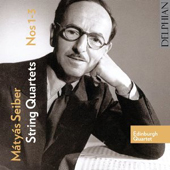
ESSENTIAL RECORDINGS

With merely a skeleton of musical material, consisting mostly of an ascending and descending single
note motif, Hungarian composer Mátyás Seiber (1905-1960) manages to create
a lush and evocative world in the second Lento movement of his String
Quartet No. 1. An early work written when he was 18 years old. Although rather
straightforward in its form and layout, this first quartet already hints at the mercurial evolution this
composer's music will experience over his creative life cut short by an automobile accident.
After about twelve years of teaching, playing cello on a transatlantic ship, playing in a quartet, becoming
the director of the department of jazz studies at the Frankfurt Conservatory, and absorbing the influence
of serialism, came the String Quartet No. 2, a radically different
work altogether. Much more confident in its harmonic design, or lack thereof depending on your
perception of it. The middle movement titled Intermezzo: Alla "Blues" points out this
composer's serious appreciation of jazz, and the extremely swift tempos in the final Presto,
sometimes sounding like spiders octopedalling quickly along the strings, certainly keep the members
of the Edinburgh Quartet working extra hard, something these musicians seem to
take in stride.
And 1951 saw the arrival of his Quartetto Lirico (String Quartet No. 3),
at which point he had mastered his art and combined the adventurous, deliberate and intellectual
nature of the second quartet with the Hungarian rooted heartfelt emotions of the first. The two outer
movements are both slow in nature, and well display Seiber's now mature and confident harmonic
language. They both end in a tone of resignation, as if knowing that they are leaving tradition behind.
Composer Hugh Wood who wrote the CD booklet notes, admires Seiber's output and considers the
third quartet in particular to be an outstanding work of chamber music. The members of the Edinburgh
Quartet, with a strong reputation for exploring unusual repertoire, certainly bring devoted playing to
this new recording, which should belong on the shelves of all chamber music fans.
Jean-Yves Duperron - June 2011